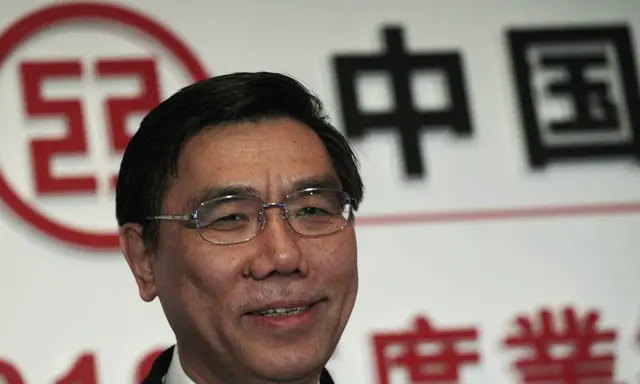Yi Huiman, president of ICBC since 2013, is expected to be appointed the bank’s next chairman, pending formal approval from state leaders
The new chairman-designate at Industrial & Commercial Bank of China, Yi Huiman, looks set to deepen ICBC’s push into digital banking as well as strengthen its “for-profit” focus, in a clear distinction from the “national duty” expected of state-owned banks, say analysts who have followed Yi’s career and leadership changes at the world’s largest bank.
At the bank’s annual general meeting in Hong Kong next month, analysts say shareholders will be presented with a new three-year and long-term strategy that Yi will oversee to transform ICBC’s outlook through to 2024.
Officials at ICBC confirmed to the South China Morning Post on Tuesday that the 52-year-old Yi, president of the bank since 2013, on Monday received a form
al appointment to the bank’s party secretary role. The move is a gesture that would formally seal his official candidacy to become the bank’s next chairman, pending formal approval from state leaders.
Yi will replace the bank’s long-serving and outspoken maverick chairman Jiang Jianqing, 63, who has been in the position since 2000 and made it his business to focus on profits as a priority even in the face of state pressure.
“It is Yi’s role now to continue that legacy. He has made his mark at ICBC by helping to shape the e-banking and internet banking strategy,” said a Hong Kong-based analyst who requested anonymity.
“If you look at ICBC’s digital strategy is really not bad viz-a-viz other international banks. In a way, the two men are similar. It is extremely rare for a ‘big four’ bank president to step out and boldly speak of the clear need to shake up the industry and innovate. Li has almost got the Steve Jobs aura about him.
ICBC is a colossal entity with more than US$3 trillion in total assets. Photo: Bloomberg
He would do well succeeding Jiang,” the analyst added.
With Yi’s formal appointment, he will be in charge of executing the “strategy book” which covers some of the key issues facing the lender, spanning from international management to strategy optimisation.
The strategy update is seen as badly needed to keep up with the times as the previous playbook was written during a completely different era. When incumbent chairman Jiang first took charge of the troubled bank, its non-performing loan (NPL) ratio was a third of the bank’s assets.
Jiang attacked the problem by ridding the balance sheet of NPLs and recapitalising by bringing in strategic shareholders like Goldman Sachs. He topped it off in 2006 by listing the bank in Hong Kong in what was the world’s biggest initial public offering at the time.
ICBC is now a colossal entity with more than US$3 trillion in total assets, pulling in a fifth of its revenue from all corners of the world. The bank is pushing itself to formalise a globalised finance network covering some 42 countries out of the 65 nations in China’s “Belt and Road” vision.
This expansion requires it to modernise operational tactics and renumeration and performance assessment metrics for its ranks, as well as implement capital adequacy planning to raise some 88 billion yuan in debt financing. In short, how to better integrate and mobilise the disparate 404 entities under the one umbrella as part of a “One ICBC” strategy - all issues that will be addressed in the updated strategic plan.
Yi joined ICBC in 1985 and worked his way up from a humble cashier’s job until he broke into the senior management ranks in 2005. He served as the deputy governor of ICBC Hangzhou, then as governor of the Jiangsu and Beijing branches before finally moving to the seat of power in central headquarters.
“It is clear that the chairmanship is a government appointment – it is there to handle and maintain balance between the government and shareholder interests,” said the analyst. “As a leader at one of the ‘big four’ state-owned banks, it is the chairman’s role to serve first his political duty. Jiang has been able to deftly balance it with the bank’s interest over the years, and he has also established ICBC as a more innovative bank that has set it apart from competition.”
Since the Agricultural Development Bank and the Export and Import Bank of China are clearly designated as the nation’s policy banks, Jiang was able to steer ICBC in the direction a commercial bank should go, even if he sometimes bucked state political pressure, according to the analyst
Other banking analysts agreed that Jiang’s forthright approach and liberal leadership at ICBC set him apart from other leaders at the big four state banks, making ICBC the most accessible and a more transparent institution in the industry, although few analysts were willing to openly comment given the political nature of such appointments.
“Jiang’s forthrightness did not sit well with many in the (central government) leadership. That’s why he was stuck in the chairmanship role over the years,” said another industry veteran who has followed Jiang over the years. “His contemporaries have advanced in their political life – some became leaders at regulators, others received governorships in provinces. It was unlucky for him, but a blessing for ICBC because it encouraged him even more to speak up for ICBC’s interest.”
This includes a particular episode which saw Jiang famously publicly tell off the central bank over its lack of transparency when it intervened in the market, which resulted in a liquidity crunch in 2013.
(SOUTH CHINA MORNING POST)
 简体中文
简体中文



